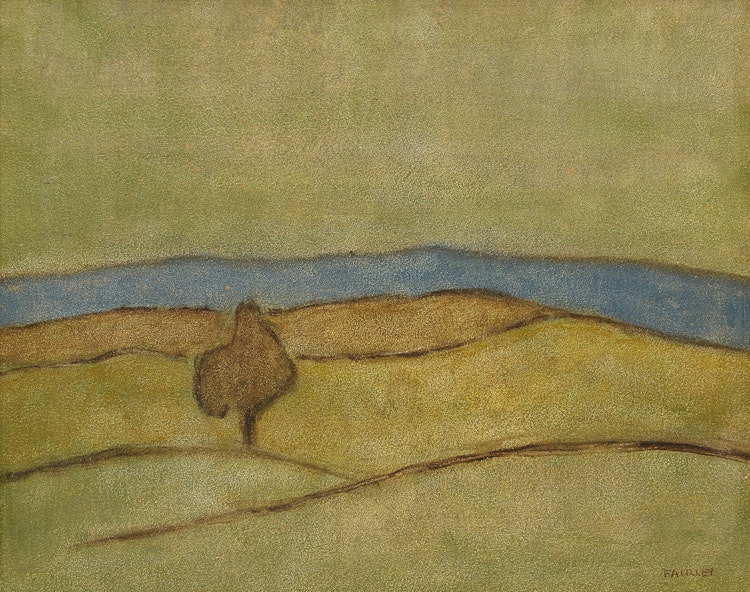Blue Distance by Barker Fairley

Barker Fairley
Blue Distance
oil on masonite
signed lower right; signed, titled and dated 1975 on the reverse
11.5 x 14 ins ( 29.2 x 35.6 cms )
Auction Estimate: $3,000.00 - $4,000.00
Price Realized $4,200.00
Sale date: December 13th 2022
Private Collection, Ontario
Share this item with your friends
Barker Fairley
(1887 - 1986) RCA
Born in Barnsley, Yorkshire, son of an elementary schoolmaster. He won a country scholarship to Leeds University, where he read Modern Languages. He graduated with First Class Honors in French and German. He took a further three years of study in Jena, Germany. He came to Canada and taught German literature at the U. of Alberta. In 1914, he married Margaret Keeling (they had five children). In 1915, he accepted the post of professor of German at the U. of Toronto. In the years that followed, his mastery of German was to earn him an international reputation as a scholar, and acknowledged authority of Johann Wolfgang von Goethe, Germany’s most famous poet, dramatist, novelist, and leading figure in the Romantic movement. He became a member of the Arts & Letters Club of Toronto and a good friend of J.E.H Macdonald. At the Club, he met the members of the Group of Seven. He became a collector of art and acquired fourteen paintings by the Group. He travelled with them on their painting expeditions and became a champion for their cause and their work. In 1920, he founded The Canadian Forum. With his wife Margaret, he used the publication to defend the Group’s work which was under fierce attack by the critics of the day. The Forum provided extensive commentary on varied cultural issues.
It wasn’t until Fairley was 45 that he began to paint. His friend Robert Finch, poet and painter, and colleague in the U. of T. French Department, invited him to go sketching one morning in 1932. Fairley reluctantly went along but soon realized how much he enjoyed painting. He became an enthusiastic painter, formulating his own personal approach to his subjects. He spent four years in the 1930’s as Head of the German Department at the U. of Manchester, where he also painted works in oils, which recorded the grim social conditions in the English industrial city. After Margaret’s death, and in the years that followed, his second wife, Nan Purdie provided him with the inspiration, encouragement and emotional security that allowed him to reach his full maturity as a painter.
Viewing his work in 1978, Gary Michael Dault noted, “Now he is a painter whose work is more lean, more spare, more deftly economical and frequently more inventive than anything the Group devised.” Dault then quoted Fairley as follows, “‘I can’t go any further in simplification than I have done with those new pictures.” Continuing, Dault noted, “There are, in fact, viewers who will find them empty and devoid of pictorial incident. But look again at their sensuous completeness. Look at the remarkable picture called ‘Black Trees’ where, against a light green sky, Fairley has daubed five or six twists of black oil paint that turn into wonderfully distant and stalwart trees…. In the painting called ‘Presqu’ile Point’, a mopped rectangle of wet, blue paint turns into a lively crystalline sky and below it, a horizontal wiping of another rectangle of wet blue paint softens into a still reach of water. They’re all like this. Painting after painting. Each of them a moment in the life of the natural world, centred on canvas and held there by the force of delight.” He would finish a picture in a day and took only one two-hour sitting for a portrait. He would search for an aspect of the subject rather than photographic likeness.
Fairley died at the age of 99, was predeceased by his first wife Margaret in 1967, and was survived by his second wife, Nan Fairley, two of his five children, thirteen grandchildren and twenty-one great-grandchildren.
Literature Source:
"A Dictionary of Canadian Artists, Volume 1: A-F, 5th Edition, Revised and Expanded", compiled by Colin S. MacDonald, Canadian Paperbacks Publishing Ltd, Ottawa, 1997

